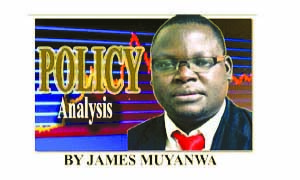SOME economic benchmarks including the foreign exchange positively responded to the declaration of United Party for National Development (UPND) leader Hakainde Hichilema as Zambia’s president-elect yesterday.
That was an intro of one of the front page stories in our edition of August 17, 2021, a day after President Hichilema was declared the winner in the August 12, 2021 general elections.
The article further indicated that the dear Kwacha appreciated the most since 2015 while the Eurobonds due in 2024 jumped by almost 10 per cent to 73.56 cents on the dollar in London, the biggest gain then since April 2020 according to Bloomberg.
A check at Golden Coin Bureau de Change in Lusaka’s Cha Cha Cha Road on the day the president was declared winner found the local currency had appreciated by nearly one Kwacha, buying at K18 .50 for a dollar from 19.45 at the last close of business.
It was selling at K18.85 from the previous week’s K19.75.
Acting Golden Coin cashier Alex Kasawa said then that the Kwacha was likely to appreciate further because investors had seen potential in the country’s economy with the election of Mr Hichilema.
A similar scenario was obtaining at BIMM Bureau de Change where the Kwacha exchange rate was at K19.30 (buying) as compared to K19.45 the previous day.
Twelve months down the lane, the value of the Kwacha has continued on its upward trajectory from the nearly K20-per dollar to around K16.
According to ABSA Zambia, the Kwacha was steady against the US dollar on Monday’s trading session but posted slight gains on improved corporate supply, adequate enough to cover demand from importers and other greenback seekers.
At 08:30hrs on Monday, commercial banks quoted the Kwacha at levels of K16.000/K16.050 and strengthened by 2.5 ngwee to close the market at K15.975/K16.025 on the bid and offer respectively.
“The local unit is projected to trade on the front foot in the near term as corporates prepare for their tax obligations this week,” partly states the bank’s Zambia market update.
The benefit of strengthening Kwacha are obvious to everyone especially those involved in the import business activities.
For sure, those running the export-related businesses have lost out and will continue doing so as the Kwacha looks set to gain more value.
Even if goods and services are quoted and sold in the local currency, the foreign exchange (forex) rate has a huge bearing on the prices of these items because of the nature of the economy which is import-oriented.
This means that traders of the imported goods first have to consider the forex rate before coming up with the prices of the goods.
What is sad is that the traders and other people who supply goods and services always factor in the forex when pricing their merchandise when the Kwacha is performing poorly.
Almost immediately there is a drop in the value of the Kwacha they will increase the prices but sadly, when the value of the Kwacha is going up, like now, they turn a blind eye to that!
Like what is currently happening in the public transport sector following the reduction in the prices of fuel.
That is counter progressive!
When it comes to reducing the prices, there is seemingly no elasticity because some traders are believably involved in unfair practices like cartels, price fixing and connivances, which is bad.
When the economic conditions entail the reduction of the prices, traders will come up with all sorts of excuses why they cannot do that.
They would, for instance, say they are still selling the old stocks or indeed that forex rate is not a major factor in their pricing. Unless when increasing the prices of the commodities?
From the layperson’s view, two quick points come up – the need to consume more of the local resources and the need to produce more goods for export market.
To maximise the economic benefits from the forex, there is need to import less and export more, then the country will be saving and growing its national strategic reserves literally and otherwise.
The rising value of the Kwacha does not now mean that we should import more consumptive goods.
That will not help to sustain the current rate of the Kwacha to the dollar and other major convertible currencies.
To help reduce the import-dependency, there is need to find alternative goods locally so that instead of using the dollar to import those goods one uses the dear Kwacha to procure locally-sourced and produced goods.
By so doing the pressure on the value of the Kwacha will be lessened.
On the other hand, there is need to identify export goods, especially the non-traditional ones and find a way of increasing the production and productivity of those items.
This will result in the increase in forex which will be earned through those economic activities.
But what has caused the rise in the value of the Kwacha starting especially merely hours after President Hichilema was declared winner?
In the past I have looked at the issue of sentiments which could either hurt or heal the economy.
We have looked at how adverse sentiments can affect the national economy and how they could truly influence the general performance of a local economy like Zambia’s.
Again, from a layperson’s point of view I can liken the economy, especially a poorly performing one, to a patient, on what some people may term deathbed.
At that point, whatever other people say about that person, obviously, becomes important as words can either revive the patient or send him/her to his/her early grave.
Some Christians describe that as the power of the tongue and it seemingly works in both spiritual and physical realms.
The economy “hears” what, especially, national leaders and the media say!
For comments call: 0955 431442, 0977 246099, 0964 742506 or e-mail:
jmuyanwa@gmail.com.







